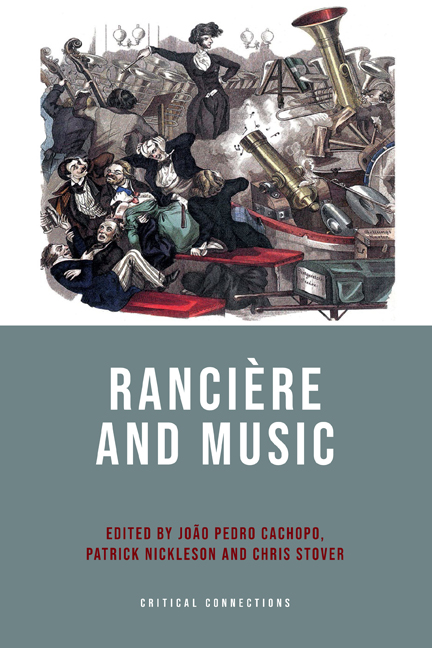Book contents
- Frontmatter
- Contents
- List of Examples
- Acknowledgements
- Notes on Contributors
- Introduction
- Part I: Music and Noise
- 1 Musique concrète and the Aesthetic Regime of Art
- 2 ‘Rip it up and start again’: Reconfigurations of the Audible under the Aesthetic Regime of the Arts
- 3 A Lesson in Low Music
- Part II: Politics of History
- 4 Wandering with Rancière: Sound and Structure under the Aesthetic Regime
- 5 Staging Music in the Aesthetic Regime of Art: Rancière, Berlioz and the Bells of Harold en Italie
- 6 Rancière on Music, Rancière’s Non-music
- 7 Coloured Opera and the Violence of Dis-identification
- Part III: Politics of Interaction
- 8 Musical Politics in the Cuban Police Order
- 9 Rancière and Improvisation: Reading Contingency in Music and Politics
- 10 Rancière’s Affective Impropriety
- Part IV: Encounters and Challenges
- 11 Rancière, Resistance and the Problem of Commemorative Art: Music Displacing Violence Displacing Music
- 12 Stain
- 13 On Shoemakers and Related Matters: Rancière and Badiou on Richard Wagner
- 14 Roll Over the Musical Boundaries: A Few Milestones for the Implementation of an Equal Method in Musicology
- Afterword
- A Distant Sound
- Works Cited
- Index
3 - A Lesson in Low Music
Published online by Cambridge University Press: 03 October 2020
- Frontmatter
- Contents
- List of Examples
- Acknowledgements
- Notes on Contributors
- Introduction
- Part I: Music and Noise
- 1 Musique concrète and the Aesthetic Regime of Art
- 2 ‘Rip it up and start again’: Reconfigurations of the Audible under the Aesthetic Regime of the Arts
- 3 A Lesson in Low Music
- Part II: Politics of History
- 4 Wandering with Rancière: Sound and Structure under the Aesthetic Regime
- 5 Staging Music in the Aesthetic Regime of Art: Rancière, Berlioz and the Bells of Harold en Italie
- 6 Rancière on Music, Rancière’s Non-music
- 7 Coloured Opera and the Violence of Dis-identification
- Part III: Politics of Interaction
- 8 Musical Politics in the Cuban Police Order
- 9 Rancière and Improvisation: Reading Contingency in Music and Politics
- 10 Rancière’s Affective Impropriety
- Part IV: Encounters and Challenges
- 11 Rancière, Resistance and the Problem of Commemorative Art: Music Displacing Violence Displacing Music
- 12 Stain
- 13 On Shoemakers and Related Matters: Rancière and Badiou on Richard Wagner
- 14 Roll Over the Musical Boundaries: A Few Milestones for the Implementation of an Equal Method in Musicology
- Afterword
- A Distant Sound
- Works Cited
- Index
Summary
In the middle of his first monograph, 1974's Althusser's Lesson, Rancière introduces a term that appears nowhere else in his published writing: ‘the low music’. La musique bas. Several scholars – including many in this volume – have noted the relative absence of music in Rancière's writing. In particular, musical works have played almost no role, in comparison to how often he turns to literature, film, poetry and sculpture in making his claims about aesthetics, politics, historiography and pedagogy. Nevertheless, in this essay I would like to consider at length Rancière's use of la musique bas as a means of thinking about what musical and sonic terminology might mean when it appears, often metaphorically, in his published writing. To do so, I would like first to consider the appearance of la musique bas in its context, within a larger critique of Rancière's teacher, Louis Althusser. Next, I will expand upon the term as staging a triadic relationship between the discourses of noise and stultification in Disagreement and The Ignorant Schoolmaster respectively. Finally, I will return to low music to argue for its potential value both as a conceptual term in music studies, and for paying closer attention to the role of a metaphorical music in Rancière's broader work. My interest is in avoiding a Rancièrean ‘lens’ or ‘frame’ or even analytic, instead proposing the concept as a reflexive check on our own methods as music scholars.
The low music
On its initial appearance, Rancière uses the term as part of a long critique of Althusser's ideas about education. Throughout Althusser's Lesson, Rancière attacks his teacher's understanding of protest and pedagogy, history and politics, often turning to the first person to reflect the reasons for his break with Althusser: ‘The starting point of my commentary’, Rancière writes in the original French preface, ‘is … an experience that a great many intellectuals of my generation lived through in 1968: the Marxism we had learned at Althusser's school was a philosophy of order whose every principle served to distance us from the uprisings which were then shaking the bourgeois order to its core.
- Type
- Chapter
- Information
- Ranciere and Music , pp. 71 - 94Publisher: Edinburgh University PressPrint publication year: 2020



